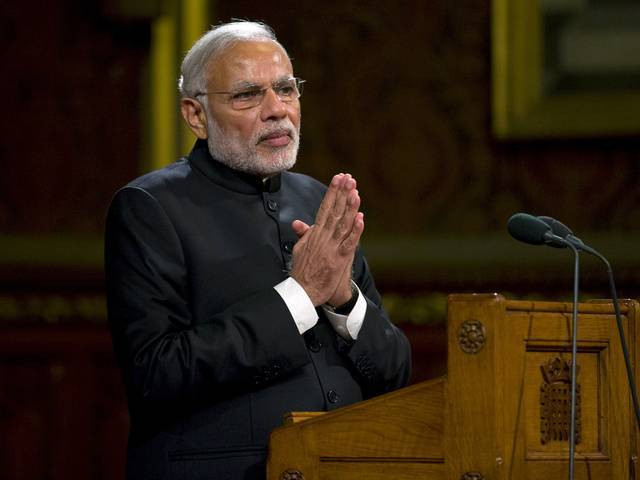#ThankYouModi for helping the Kashmir cause
Despite bitter realities, India by and large is still in a state of denial

Indian Prime Minister Narendra Modi. PHOTO: REUTERS
The decades-old dispute would not have been in the international headlines had Modi government not committed glaring blunders.
The 49-page report by the office of UN High Commissioner on Human Rights has certainly put India on the back foot, although it has publicly rejected the world body’s findings. This was the first time a UN body conducted such a detailed study of the precarious situation in the India-held Kashmir. What is even more significant is the fact that the UN rights chief wants the establishment of a Commission of Inquiry (COI) to look into the allegations of India’s gross human rights violations in the scenic valley.
Kashmir shut ahead of Modi’s visit
Whether the UN Human Rights Council eventually decides to establish a COI or not, the fact is that India is fighting a losing battle in Kashmir. The reason for the current precipice in the Himalayan region is the ‘muscular policy’ pursued by Indian PM Modi since he took over in 2014. The architect of this doctrine is National Security Adviser Ajit Doval. In addition to the use of brute force in Kashmir, the Modi government also tried to change the rules of engagement with Pakistan on Kashmir. For example, it cancelled the scheduled talks between national security advisers in New Delhi after the Pakistani High Commissioner invited some Hurriyat leaders for a meeting in August 2015. In the past Hurriyat leaders not only regularly met Pakistani diplomats in New Delhi but also travelled to Islamabad. Even pro-Indian Kashmiri leaders used to frequently visit Pakistan when the two neighbours had a sustained dialogue process from 2004 to 2008. Greater interaction between Kashmiri leaders from the two parts as well as with Pakistani and Indian officials was one of the key confidence-building measures (CBM) meant to ease tensions. And that CBM had considerably changed the atmosphere in India-held Kashmir. There was decline in violence as Kashmiris were pinning great hopes on the dialogue process.
But Ajit Doval had different ideas. He thought that the best way to resolve the Kashmir dispute was to use force. An identical tactic was applied in relations with Pakistan. The Indian army was given a free hand to carry out indiscriminate firing along the Line of Control (LoC) and the Working Boundary. The Doval doctrine was simple — suppress the movement in the valley and tell Pakistan forget Kashmir. But the plan has clearly now backfired as it has further ignited the already volatile Kashmir situation and made Pakistan all the more relevant. Thanks to India’s follies, today, Kashmir is back in the international limelight. Popular uprising is growing with every passing day.
The worry for India is that unlike the past revolts this time young and educated Kashmiris are becoming part of the movement. Saner voices in India have admitted that Modi’s ‘muscular policy’ has only amplified the anti-India sentiments in the valley.
But despite these bitter realities, India by and large is still in a state of denial. Because of its growing international clout, the so-called nationalists in India remain under the illusion that the country can fix the Kashmir issue by the use of force. Many Indians would find it derogatory but their government sooner or later would be left with no other option except to seek talks with Pakistan. India has to abandon Doval’s plan because only that will give it some breathing space in Kashmir.
Published in The Express Tribune, June 25th, 2018.
Like Opinion & Editorial on Facebook, follow @ETOpEd on Twitter to receive all updates on all our daily pieces.













COMMENTS
Comments are moderated and generally will be posted if they are on-topic and not abusive.
For more information, please see our Comments FAQ